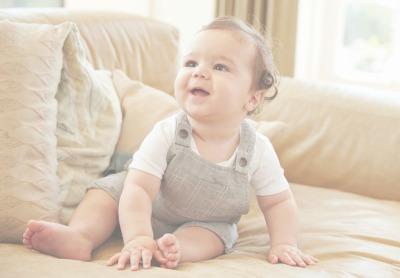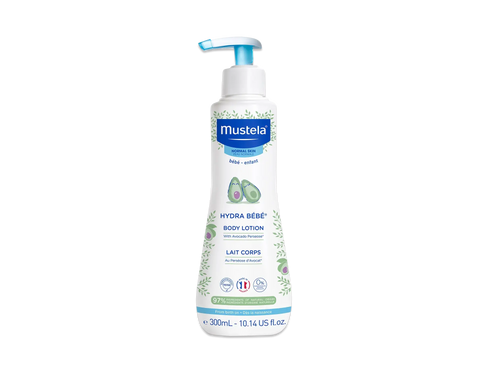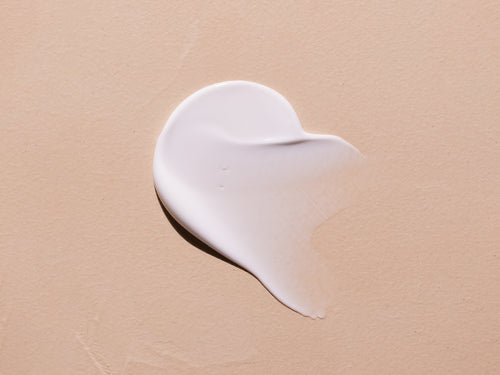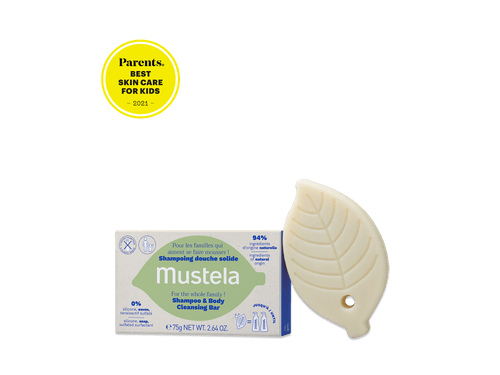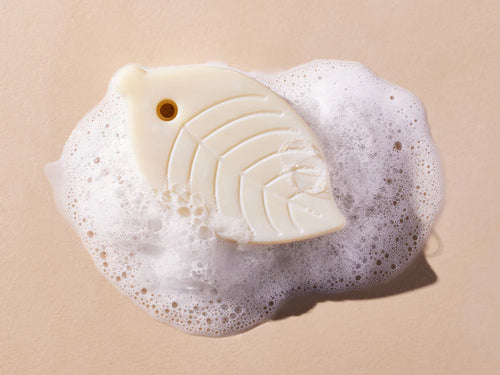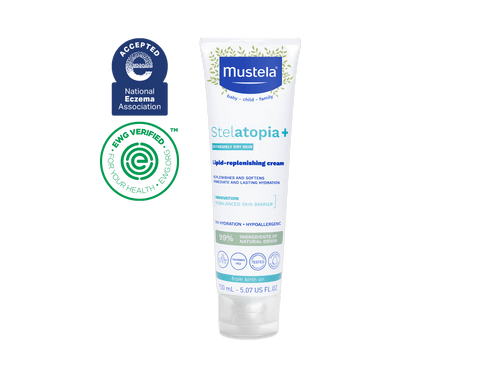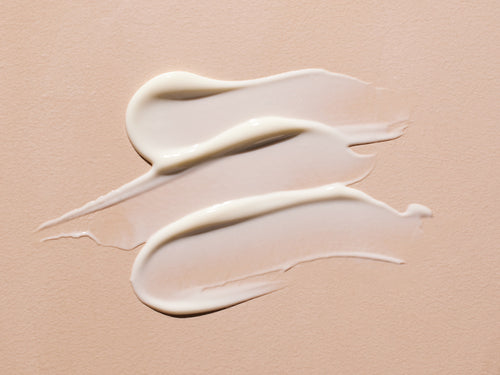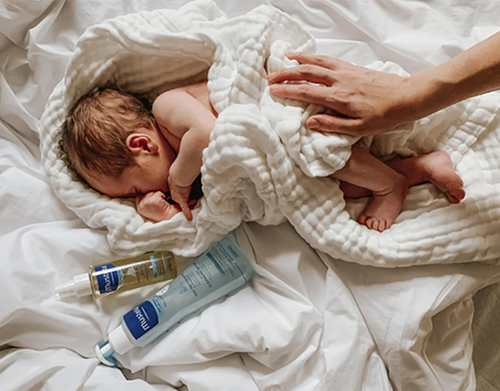There’s nothing like watching your child grow up. Now that your 10 month old baby is crawling, eating solid foods, and attempting to say their first basic words, you’re probably wondering how your little one grew so fast!
In this post, the baby experts at Mustela will explain everything you need to know about caring for your 10 month old baby. We’ll cover your little one’s development, senses, motor skills, feeding schedule, sleeping habits, and immunizations.
We will also include some general childcare tips for your 10 month old baby, a few signs of developmental delays to keep an eye out for, and reminders to take care of yourself, too!
Caring For Your 10 Month Old Baby
After 10 full months of parenting, you’ve certainly become an expert at many childcare tasks. You’ve mastered the art of carrying your baby, developed the perfect daily hygiene routine, and become a pro at changing dirty diapers.
However, your little one grows so quickly that it may feel difficult to keep up! You might have a few questions about your 10 month old baby. Keep reading to learn everything you need to know about caring for your little bundle of joy.
Your 10 Month Old Baby’s Development
Let’s begin with your 10 month old baby’s height and weight. Baby boys are, on average, between 28.1 inches (71.5 cm) and 29.3 inches (74.5 cm) in height and 18.7 pounds (8.5 kg) to 21.6 pounds (9.8 kg) in weight.
Baby girls at 10 months are normally a bit smaller, weighing on average between 17.2 pounds (7.8 kg) and 20.3 pounds (9.2 kg) and being 27.6 inches (70 cm) to 28.7 inches (73 cm) tall.
Remember that babies, just like adults, come in a wide variety of heights and weights. So there’s no need to worry if your baby is a little smaller or larger than other 10-month-olds. The figures above are just averages.
Your 10 Month Old Baby’s Senses
Your little one’s senses have come a long way in 10 months! Let’s have a look at each of the five senses now.
Hearing
Your 10 month old baby’s hearing is much sharper than it was even just a few months ago.
Your little one knows the sounds of your voice and your partner’s voice, and may also be able to recognize other sounds, such as a phone ringing, your doorbell, or perhaps the sounds of a family pet.
Sight
Much like your 10 month old baby’s hearing, their sight is almost fully developed. For the first several months of your little one’s life, they were unable to see objects more than 10 or 15 feet away from their face.
Now, your baby’s vision is sharp and clear. They can see all the way across a large room and recognize familiar faces. They can see colors, shapes, patterns, and spot their favorite toys from a distance.

Touch
At 10 months old, your baby is full of curiosity and wants to touch everything within sight. That’s why it’s so important to babyproof your home and keep dangerous objects out of your child’s reach.
Once you’ve made sure your baby’s environment is safe, feel free to encourage their curiosity.
Speaking of touch, you may have started baby massages when your little one was brand new, but if not, it’s not too late!
Giving your baby a massage is a great way to bond, but it can also help calm your baby, aid in development, and help them sleep better.
For a massage that’s natural and gentle on your baby’s skin, we recommend using Mustela’s Baby Oil, which is made of 99% naturally derived ingredients and is free of parabens, phthalates, and phenoxyethanol.
To read about more of the benefits of baby massage as well as tips on how to give one, check out our article here.
Taste
Your child’s sense of taste is developing quickly as they begin to try new foods and flavors. Naturally, your little one may prefer the taste of some foods to others.
Continue introducing them to new foods, and take note of which foods they enjoy the most.
Smell
Your little one has a keen sense of smell but is still becoming familiar with new smells and categorizing them in their mind.
Your 10 Month Old Baby’s Motor Skills
You may have noticed that your baby now has a full range of motor skills. Your little one can:
- Crawl around your home with ease
- Sit up without assistance
- Roll over from their tummy to their back (and vice versa)
- Lift their body into a seated position during tummy time
- Use a pincer grasp (thumb and index finger) to hold small items
- Make a fist and grip objects
- Stand while leaning or holding onto furniture or other large objects
Bear in mind that all children are different. It’s not a cause for concern if your 10 month old baby has yet to reach one of these milestones.
Language Skills
Around 10 months of age is also when your baby will begin trying to communicate with you. This may come in the form of baby babble — simple sounds like “bah” or “muh” — or it may come in the form of body language and facial expressions.
It’s important to recognize when your little one is trying to communicate something. You can respond to them with words and have a conversation with them, even if they aren’t saying anything intelligible. This will help them to improve their speaking abilities.
Your 10 Month Old Baby’s Feeding Schedule

Medical professionals generally recommend introducing solid foods to your baby’s diet at around six months of age.
At this point, your 10-month-old baby is eating a wide variety of foods without any trouble. Your little one may even be able to hold a spoon and eat on their own.
While solid foods are a major component of your baby’s diet, breast milk and/or baby formula should also still be included.
Healthcare experts suggest breastfeeding exclusively for the first six months of your baby’s life and then continuing to breastfeed or provide baby formula (reducing the frequency) until 24 months. This makes weaning your baby off of breastmilk a slow, manageable transition.
For now, your baby should still be getting roughly half of their calories and nutrients from breast milk and/or baby formula. The other half of their nutritional needs can come from soft foods like bread, noodles, fruits, veggies, cheese, and cereal.
It’s difficult to offer general advice on how much and how often your 10-month-old baby should eat since all babies are different.
As a guide, your baby should eat three meals and two small snacks of solid food per day, plus a feeding of breastmilk or baby formula an additional three to five times per day.
Your 10 Month Old Baby’s Sleeping Habits
Your 10 month old baby is likely sleeping all the way through the night, allowing you to get some much-needed rest.
Babies typically sleep around 14 hours per day at 10 months of age: 10 to 11 hours at night and then another three to four hours during the day (in the form of two naps).
Your 10 Month Old Baby’s Immunizations
Fortunately, there are no baby checkups or immunizations scheduled for the 10-month mark. However, your little one should have already received a number of immunizations, including:
- Polio vaccine (IPV)
- 2 rounds of Hepatitis B vaccination (HepB3)
- 3 rounds of Haemophilus influenzae type B vaccine (HIB)
- 3 rounds of Pneumococcal conjugate vaccine (PCV)
- 3 rounds of Rotavirus vaccine (RV)
- 3 rounds of Diphtheria, tetanus, and acellular pertussis vaccine (DTaP)
If your 10 month old baby isn’t up to date with immunizations, now is the perfect time to get caught up.
General Childcare Tips
Diaper Changing

Your baby is certainly growing up and may be toddling around soon, but you still have many, many months before they’re potty-trained and out of diapers!
To help avoid irritation and diaper rash, remember to change your baby’s diaper when it is wet or dirty. And don’t stop at simply changing their diaper.
Clean their skin and all their chubby folds with a gentle diaper wipe like Mustela’s Cleansing Wipes. Then finish the job with diaper cream.
One of our best-selling products is our Diaper Rash Cream 1 2 3, which is made with zinc oxide and beeswax to naturally soothe and protect your baby’s skin with every diaper change.
For an organic option, try our Diaper Cream with Olive Oil and Aloe. This cream is not only a dream for your baby’s skin, but it is also eco-friendly. The packaging is made from sustainably sourced sugar cane, and we’ve gotten rid of secondary cartons.
Plus, the formula itself is biodegradable and meets EWG Verified™ criteria, which means that it avoids EWG's ingredients of concern and is committed to full transparency.
Babyproofing Your Home
As soon as your baby can roll over, they’re practically mobile. But your 10 month old is probably extra busy exploring their world by pulling up and crawling.
And they may be walking sooner than you think!
Babyproofing is an essential part of keeping your baby safe. Here are a few tips for babyproofing your home:
- Lower your baby’s crib mattress so they can’t pull up and fall out of the crib
- Keep the crib out of reach of cords, blinds, curtains, and the like
- Raise curtains and blinds so your baby can’t pull on them
- Cover all electrical outlets
- Keep small objects out of your baby’s reach (this includes magnets on the fridge!)
- Install safety locks on drawers and cabinets that contain dangerous items
- Use baby gates for stairs and fireplaces
- Put a childproof lock on the toilet as well as any trashcans your little one can reach
Bathtime
First of all, when it comes to bathtime safety, there’s one thing to remember: never leave your baby unattended in the bathtub!
Even though your 10 month old can sit up, it’s not safe to leave them or let yourself be distracted while they’re taking a bath.
Secondly, it’s a good idea to take stock of the bathtime products you use for your baby. It’s important to take special care of your baby’s delicate skin. It’s not uncommon for 10 month old babies to develop skin conditions like baby acne, cradle cap, or eczema.
Always use gentle, baby-friendly skincare products, like Mustela’s. Choose products made from natural ingredients, including bathtime products, hydrating lotions, and sunscreens. All of Mustela’s products are made especially for your baby’s delicate skin.
We recommend keeping your baby clean from head to toe with Mustela’s Gentle Shampoo and Organic Cleansing Gel with Olive Oil and Aloe. And make bathtime both therapeutic and fun with our Multi-Sensory Bubble Bath!
This bubble bath is composed of 88% plant-based ingredients including marine extracts to help maintain the skin's water balance, cornflower extract to soften skin, and our signature Avocado Perseose to help protect and hydrate your baby’s skin.
Playtime

Your 10 month old baby gets more playful and interactive by the day! For babies and kids, play is not just a way to pass the time. It contributes to their mental, physical, and social development.
So, get busy playing with your little one!
Interactive Games
Take time to focus on interacting and playing with your baby. Make plenty of eye contact and have a conversation with them even though they can’t talk back to you.
Get on your hands and knees and “chase” after your baby. Or try to get your baby to mimic simple movements or actions.
Reading books with your 10 month old is another great way to interact with them. And, if you can get them to help turn the pages, reading will develop not only language and cognition skills but also motor skills!
Pincer Grasp Activities
When we talked earlier about your baby’s development, we mentioned that around 10 months is when your baby will start using their thumb and index finger to grab onto things.
This is called a pincer grasp, and there are lots of games you can play to help your little one develop this skill.
Basic building blocks are a good way to start. Creating towers (and knocking them down!) can be a fun way to engage your child.
Plus, when your baby starts eating finger foods like cereal, they’ll automatically get practice with the pincer grasp if they feed themselves.
You can also try stuffing socks into a ball with large holes and letting your baby pick the socks out. Last but not least, get creative by putting items in egg cartons so that your baby can pick them out and put them back.
Just remember to supervise closely and use items that your baby can’t choke on.
Naptime And Bedtime
At 10 months old, your baby is taking a couple of naps a day. And while your little one is hopefully sleeping through the night by now, those naps are essential, too!
If you don’t have a bedtime routine with your baby, it’s not too late to start one. Doing the same activities in the same order before bedtime will help your baby clue into the fact that it’s time to wind down and sleep.
For some families, a bedtime routine simply includes a diaper change, putting pajamas on, cuddling and reading a book, and a goodnight kiss.
Other parents may want to include a calming baby massage, singing a lullaby, or a bath.
Expert tip: If your little one has eczema-prone skin, dress them in Stelatopia Skin Soothing Pajamas before bed for skin-soothing moisture and restful sleep all night!
When To Be Concerned

As a parent, your baby’s health, happiness, and wellbeing are of utmost importance to you! And as your little one rapidly grows and develops, you may find yourself wondering if they’re on target developmentally.
Here are some signs of a developmental delay that you should be aware of:
- Your baby does not recognize your face or voice
- Your baby does not make or hold eye contact
- Your baby does not yet smile or laugh
- Your baby cannot crawl or sit up on their own
- Your baby cannot make a fist or grasp objects
If your baby has not shown these behaviors by 10 months old or if you’re concerned about your baby’s development for other reasons, head to your pediatrician immediately.
As long as your 10-month-old baby isn’t showing any signs of a developmental delay, you have nothing to worry about. All babies follow their own path and hit milestones on their own time.
Keeping Well As A Parent
Even though you’ve been at this parenting gig for 10 months now, you may still find yourself getting used to everything it involves.
Go easy on yourself and remember that you’re learning as you go! And remember to take care of yourself as well as your precious little one.
When it comes to mental and emotional health, this might mean going outside for a walk, taking time to hang out with family and friends, or seeking professional help or counseling.
While playdates are not essential for your baby’s social development at this age, a playdate with your friend’s baby might do you a world of good. Your babies can coo at each other, and you will be able to enjoy some much-needed grownup conversation.
It’s also important to take care of your body by staying active, doing what you can to eat a balanced diet, and caring for your skin.
If you’re breastfeeding and find yourself with sore or cracked nipples, you’ll need to show them some extra TLC. Reach for Mustela’s Nursing Comfort Balm to ease discomfort and moisturize and protect your nipples.
Enriched with vitamin E to nourish and protect your skin, our vegan, fragrance-free, and dye-free formula is made with 100% naturally derived ingredients so you can feel good about what you’re putting on your skin.
Caring For Yourself And Your Little One

You’re in for a lot of fun with a curious 10 month old baby on your hands! Their five senses and language and motor skills are developing rapidly, and you probably have a mobile baby by now.
Care for your growing little one by babyproofing your home, making bathtime fun and therapeutic with Mustela’s Organic Cleansing Gel and Multi-Sensory Bubble Bath, and engaging in interactive playtime to develop their pincer grasp and other skills.
And, amidst all of the parenting, don’t forget to care for yourself mentally and physically. For sore nipples, use a skin-soothing cream like our Nursing Comfort Balm.
Finally, remember to give your little one plenty of TLC and cherish all the precious moments — your 10 month old baby will be grown up before you know it!


